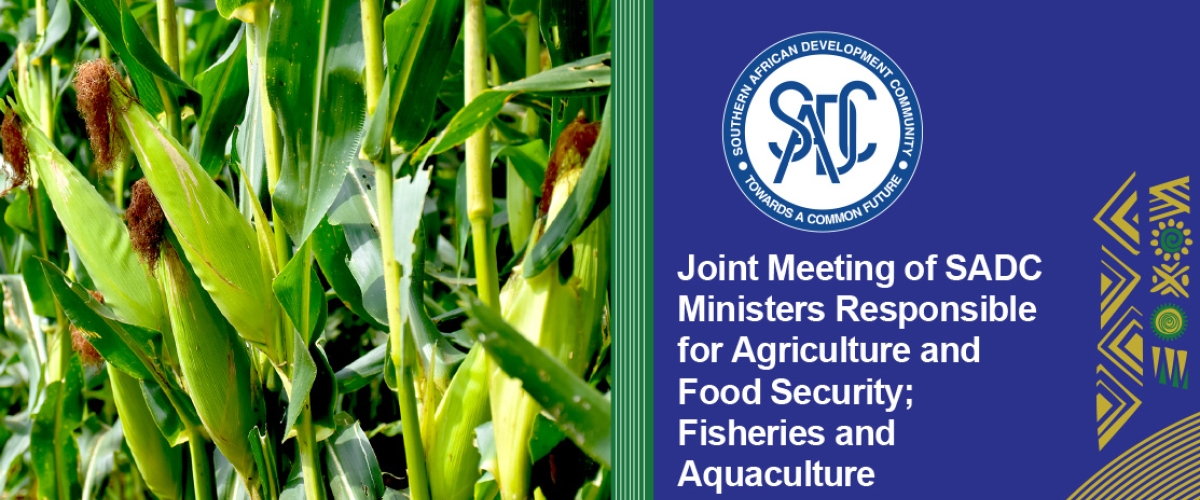
Courtesy: SADC Secretariat
SADC Ministers responsible for Agriculture and Food Security, Fisheries and Aquaculture met virtually on 30 May 2025 to review the overall regional food security situation, the status of implementation of the Comprehensive Africa Agriculture Development Programme (CAADP)/Regional Agricultural Policy, review the SADC regional crop development programme, SADC regional livestock development program, regional agro-processing value chains, management and sustainable utilisation of plant genetic resources for food and agriculture, SADC regional fisheries and aquaculture programme and blue economy and an update on the operations of the Centre for Coordination of Agricultural Research and Development for Southern Africa (CCARDESA).
The meeting was chaired by Honourable Dr Anxious Jongwe Masuka, Minister of Lands, Agriculture, Water and Rural Development of the Republic of Zimbabwe and Chairperson of SADC Ministers responsible for Agriculture and Food Security, Fisheries and Aquaculture. He highlighted the challenges facing the region in the field of agriculture such as food insecurity caused by many factors that include negative effects of climate change and urged the meeting to explore various options to address these limitations to ensure a SADC region that is food and nutrition secure.
The SADC Deputy Executive Secretary for Regional Integration, Ms. Angèle Makombo N’tumba thanked the Ministers for prioritising the SADC meeting meant to discuss the region’s food security. She outlined SADC’s ongoing efforts to address the agricultural challenges through various initiatives such as the Regional Agricultural Policy and the SADC Industrialisation Strategy.
The Ministers noted the negative effects of the 2023/2024 El Nino induced droughts on food and nutrition security for the region. They also noted the dry spell witnessed in many parts of the region that resulted in near loss of crops. Ministers further noted that from January–February 2025 rains improved conditions for crops and pastures in many countries although they lamented damages induced by Tropical Cyclones and storms (Chido, Dikeledi, Garance, Honde, Elvis, Faida) in the form widespread flooding, fatalities, infrastructure damages, emergence of widespread crop pests and diseases; and displacement of people in Botswana, Malawi, Zambia and Zimbabwe. Ministers urged Member States to improve drainage systems in flood-prone areas, and water harvesting in dry areas; improve early warning systems and emergency responses for floods and pests and directed the Secretariat to support Member States in the development and capacity building in early warning systems and emergency responses to floods and pests.
The Ministers also reviewed the implementation of the Regional Agricultural Investment Plan (2017-2022) which recorded some successes despite many limitations and approved the new CAADP regional implementation blue print the RAIP (Regional Agri-food systems Investment Plan) (2023-2030) has been developed to fully align and harmonize with the Kampala Declaration. Ministers urged Member States to fast track the development of the implementation plans and implement the new Regional Agriculture Investment Plan (RAIP) 2023-2030), the Kampala Declaration and support the implementation of STOSAR II with the support of the Secretariat.
The Ministers further reviewed the regional agro-value chains program and approved the SADC Rice Development Strategy and urged Member States to implement the strategy to realise the set targets of improving rice development in the region.
The Ministers approved the revised Regional Fertilizer and Soil Health Programme (RFSHP), Guidelines for registration of biopesticides as safer alternative in pests and disease management, the Strategy on the Management of Highly Hazardous Pesticides to minimize use of dangerous pesticides in the control and management of plant pests and diseases, the Roadmap to Leverage Sustainable Agricultural Mechanization for Climate Smart Agriculture (SAM4CSA) in Southern Africa, Post-Harvest Losses Management Strategy for SADC and urged Member States to implement it in their respective countries with support from the Secretariat.
The Ministers noted progress made in the implementation of the Harmonized Seed Regulatory System (HSRS) urged Member States that have not yet ratified the PVP Protocol and SADC Seed Charter, to quickly do so for the full implementation of the SADC Harmonized Seed Regulatory System.
The Ministers noted progress made in the implementation of past decisions regarding the promotion of conservation and utilization of plant genetic resources for food and agriculture and urge Secretariat and Member States to do more to implement outstanding decisions to completion. They also urged Member States without national PGR policies to urgently develop them to give the NPGRCs roles of coordinating PGR activities in these Member States. Ministers also directed Secretariat to commence the process for the SPGRC to join Article 15 Institutions of the ITPGRFA and congratulate South Africa for joining the International Treaty on Plant Genetic Resources for Food and Agriculture (ITPGRFA). They also directed Secretariat to fast track the operationalisation of the regional animal gene bank.
The Ministers adopted the report on the SADC Protocol protecting fisheries and the diversification of fish production through support to aquaculture value chains and urged Member States to continue implementing the Protocol. Ministers also approved the proposal for “Genetic improvement of indigenous fish species for enhanced production and productivity of aquaculture value chains in the SADC region”, the “Strategic Guide to Assess the Conformity of Fishery Products Improving Trade under the OSBP in the SADC Region” and the “SADC Recipe of Aquatic Foods”. They commended the African Development Bank (AfDB) and the Global Environment Facility (GEF) for continuously supporting the regional fisheries priorities, and the PROFISHBLUE Project Implementation Partners (African Regional Organisation for Standardisation (ARSO), Food and Agriculture Organisation of the United Nations (FAO), United Nations Industrial Development Organisation (UNIDO), WorldFish, and World-Wide Fund for Nature (WWF)), and Member States for ensuring successful implementation of the project.
Read from the SADC website here.






